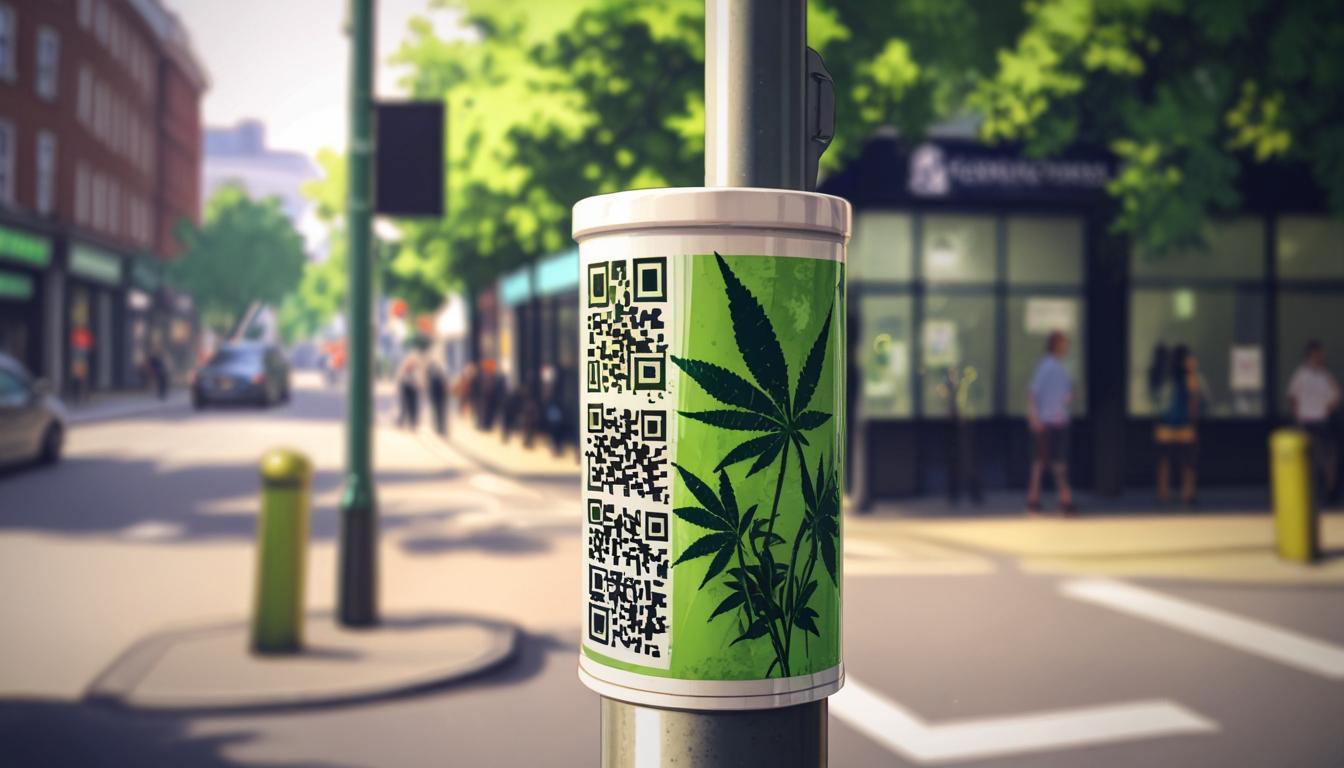The emergence of QR code stickers promoting online cannabis sales across the UK has raised significant alarm in communities from Burton upon Trent to Birmingham and beyond. These stickers, often found on public bins, lamp posts, and near educational institutions, prominently feature a green cannabis leaf alongside the enticing phrase "get your delivery." Individuals like Steve, a former prison officer dealing with chronic pain, have turned to these codes seeking an alternative to prescription opiates, highlighting a troubling tendency to engage with illicit drug markets due to perceived accessibility and anonymity.
Once scanned, these codes lead users to sophisticated websites selling an array of cannabis products, including vapes, pre-rolled joints, and edibles, all marketed with the promise of swift, discreet delivery directly to one's door. The operation's professionalism is noteworthy; Steve described a sense of apprehension as he awaited his first delivery, encapsulated in the humorous yet concerning assertion, “the package absolutely stank.” Reports have surfaced revealing that these stickers are not isolated incidents but part of a network spanning various locations, including larger cities like Glasgow and smaller towns such as Shrewsbury and Droitwich.
An investigative report has further illuminated the intricacies of this operation. According to findings, the stickers lead to multiple websites that are interconnected by a web of Lithuanian nationals who are allegedly using UK addresses as fronts for their activities. The financial dealings connected to these operations have proven substantial, with estimates suggesting one site alone received around $109,000 in cryptocurrency by March, indicating an underbelly of organised crime that goes well beyond casual drug-dealing.
The alarming proliferation of these QR codes is highlighted by Dr Simon Erridge of Curaleaf Clinic, who warns that those purchasing from these websites are engaging in a dangerous gamble. His institution’s research shows that a staggering 90% of illegal cannabis samples seized had harmful contaminants such as mould, lead, and dangerous bacteria. Additional analyses revealed that nearly half of the tested samples lacked any compounds naturally derived from cannabis, with a significant portion containing synthetic and potentially fatal substances.
While many are drawn to these accessible online operations, the dangers are evident and multifaceted. Young adults, particularly those aged 18-24, are increasingly engaging with these illegal markets; recent surveys indicate that online purchases of cannabis have surged, with 11% of users admitting to this practice, demonstrating a clear shift in drug-seeking behaviour towards digital platforms. Many, like Sarah, a professional in her 40s, opt for online purchases over street deals due to perceived safety, although the risk of encountering illicit, potentially harmful products remains a formidable concern.
Policing this phenomenon has proven challenging. Authorities have acknowledged the new dynamic introduced by QR code systems, stressing the crucial role these stickers play in organized drug operations. While several arrests have been made, including a high-profile case in Shrewsbury, the broader problem continues to evolve. Police are actively removing these stickers but report difficulties in identifying the individuals responsible for their placement. Detective Constable Matt Pedrick from West Mercia Police noted, "Websites advertising cannabis are probably based outside the UK," a fact that complicates enforcement efforts further.
The apparent ease with which these operations thrive has led experts like former National Crime Agency head Tony Saggers to express concern that some criminals may operate with impunity, demonstrating "an evolution of online drug markets" that places increased temptation before vulnerable populations. He stressed the necessity of public awareness and vigilance while engaging with such online platforms.
Law enforcement agencies are working alongside local councils to dismantle this burgeoning market, but the community must remain informed about the risks associated with engaging with these QR codes. The police's stance seems clear: individuals are encouraged to avoid these websites and report sightings of stickers that promote illicit drug sales. The convergence of technology and drug distribution poses ongoing challenges that will require concerted efforts from law enforcement, healthcare professionals, and community members alike to navigate successfully.
Reference Map
- Lead article
- Related emphasis on drug QR codes around King's Lynn
- Investigation results on arrests related to Shrewsbury sticker issues
- Concerns raised in Sutton Coldfield about the proximity to schools
- Challenges faced by Derbyshire police in dealing with QR code stickers
- Reports and warnings about QR code use near schools in Worcester
- Compilation of data on cannabis QR code sightings and community reports
Source: Noah Wire Services
